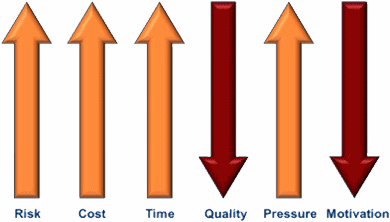Talent Management Area 3: Managing and Retaining Talent
Clearly, recognizing and rewarding talent is one of the keys to growing it.
It is also one of the keys to retaining it. In an era when every Enterprise has
Talent Scouts on the search for your project talent, savvy Enterprises apply consistent
strategies for retaining it — protecting your investment. This is especially
important if your enterprise is one that is experiencing the outflow of talent
resulting from retiring baby boomers. Consistent, enterprise-wide Talent Management
strategies are also important if your Project Culture includes conflicting priorities,
unrealistically tight deadlines, limited resources, and unavailable talent —
with project progress based more on pressure and heroics, than on competent PM practices.
Difficulties in Managing Project Talent
It is not easy to manage top talent. Talent is finicky, temperamental, and
sometimes prima donnas. Just look at young celebrity talent to see how difficult
it can be. This view may provide clues for managing your Enterprise's talent.
One key to managing talent is to continue to provide new challenges. Those who
are "topped out" may choose to find new challenges in other companies. So keep
those challenges, and the resulting learning (and rewards and recognition), coming
Retaining Project Talent begins with institutionalizing four simple actions:
- Responding to needs quickly and correctly
- Maintaining team motivation and morale
- When losing Talent, act decisively and wisely
- Apply proper PM practices in Talent Management ("Eating our own dog food")
Responding to needs quickly and correctly
 The diagram at
the right shows the typical sequence of events when a project loses talent. Risk,
Cost and Time go up. Quality always goes down. Well-meaning, but not yet competent
Managers put pressure on the team to "catch up." Why not? It worked last time!
Team motivation goes down. Risk, Time and Cost continue to go up, and Quality
continues to go down. There are far smarter ways to manage a situation like this,
yet the actions most often taken do more damage than doing nothing at all. The diagram at
the right shows the typical sequence of events when a project loses talent. Risk,
Cost and Time go up. Quality always goes down. Well-meaning, but not yet competent
Managers put pressure on the team to "catch up." Why not? It worked last time!
Team motivation goes down. Risk, Time and Cost continue to go up, and Quality
continues to go down. There are far smarter ways to manage a situation like this,
yet the actions most often taken do more damage than doing nothing at all.
Of course, a high performing project team will tell their managers exactly
what support they need, and the project and business consequences of receiving
it, versus not receiving it. Even then, some not-yet-competent managers will ignore
the team's advice.
|



